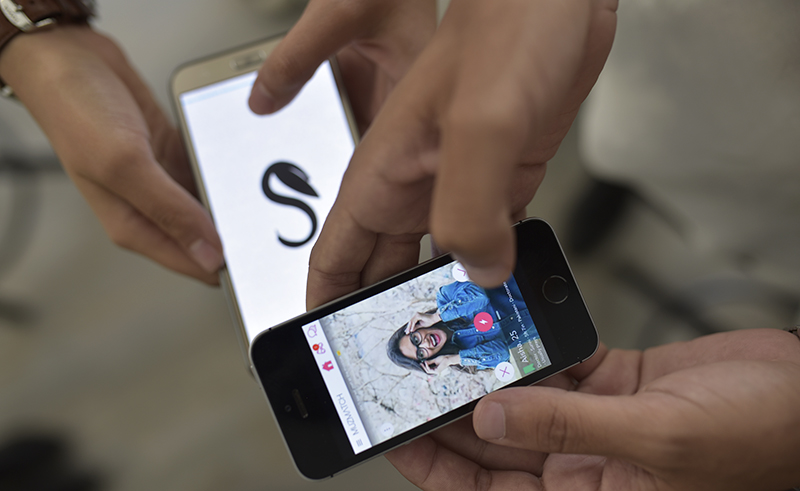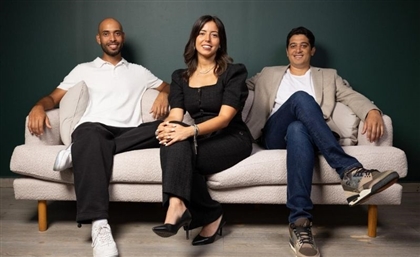9 Cute, Quirky and Downright Controversial MENA-Focused Dating Startups
The ubiquitous swipe deck-based Tinder just hit a $3 billion valuation. But in the Middle East, where dating has an etiquette of its own, entrepreneurs are cashing in on the popularity of online dating by giving it a regional twist - from halal dating to polygamy-enabling apps.

One of the few things you can count on never going out of style is love, so it's no surprise that the online dating business is booming. Case in point: the addictive, ubiquitous swipe deck-based Tinder just hit a $3 billion valuation. It hasn't quite transcended its reputation as a casual, occasionally-slimy hookup finder, but that hasn't stopped it from becoming the world's most downloaded dating app.
In an effort to improve and capitalise on Tinder's prevailing popularity, developers around the world have been tweaking its winning formula to suit their niches, whether geographical, cultural, or religious. Some of the MENA's newest and increasingly popular dating platforms are designed with culture in mind, with settings that value privacy, modesty and specific religious values. So we've rounded some of the MENA's craziest, cutest and controversial dating startups that cater to regional singles.
1. Matchmallows
Matchmallows is the personality-based antidote to the sometimes superficial approach of photo-heavy apps like Tinder. Created by three married Lebanese friends in 2015, the app asks its users image-based personality questions developed by psychologists, and creates a personality profile. Uploading personal profile pictures is optional. The app then makes match suggestions to its users based on the way they answered the personality questions and assign them a compatibility percentage. One of its perks is the emphasis on privacy - its users are not pressured to add photos or share identifying details. Matchmallows is free, but (hilariously) if you sincerely believe that opposites attract, you can pay $9.99 a month to see your least-compatible matches.

2. Wango
"Wango knows what women want." I'm tempted to be skeptical of a male-owned startup making such a bold claim, but Lebanese developer Julian Smida promises that Wango is a woman-friendly dating app in a male-dominated market. "Wango is the first and only dating App designed from a woman’s perspective with a unique Gentleman’s touch. This finally gives ladies the opportunity to browse for the man of their dreams while men are obligated to adhere to a Gentleman’s Code of Conduct," says Smida. Men who misbehave are banned. What makes Wango (short for "wanna go?") different, aside from its Gentleman's code, is the app's approach to dating. The startup was accelerated by Speed BDD and this year graduated from the Lebnet Ignite programme in Silicon Valley. In June 2016, they expanded and launched in South Africa.

3. Sila Match
Say hello to the newest "halal Tinder" app. Launched in May 2017 and targeted to Middle Eastern users, the app was founded by UCLA graduate and entrepreneur Nathan González Mendelejis. Sila's humorous ads play up the juxtaposition between the pitfalls of modern dating and arranged marriages. What makes this app unique? Women have the option of hiding their photos, and the app asks its users a handful of questions to compare to potential matches. The compatibility questions are, let's say, somewhat questionable. Asking how often you'd like your partner to call you is one thing, but some users are definitely going to raise an eyebrow at being asked if the woman should stay at home and raise the children while the man works. It's an undoubtedly sexist question, but if two people both share this vision for their future lives together, maybe they'll meet on Sila Match.
4. Wesal
Palestine's Gaza Strip is home to one of the world's most controversial new dating platforms. Wesal (meaning reunion in Arabic), is the first of its kind in the religiously conservative area, where Tinder and similar apps are banned. The site was launched by entrepreneur Hashem Sheikha, 33, in March 2017. In six months since its launch, the site has already led to 160 marriages, a pretty high success rate for such a niche community in a short amount of time.
So where's the controversy? Wesal claims to be a halal approach to dating, acting as a digital vehicle for old courtship rules to continue on. The site allows men to look for their first, second, third or fourth wives, and women have the option of specifying between a single and married man. The site has provided a viable path for widowed women to find new husbands, where it can otherwise be difficult for them to meet new potential partners. Its users upload basic information about themselves such as age, occupation, salary, number of children, but the selection process doesn't involve photos or chatting. When two users express mutual interest, the potential groom must go to his prospective wife's house and propose within 48 hours. Men who fail to follow through are banned from the site.
5. Muzmatch
It looks like Tinder. It swipes like Tinder; but don't call it Muslim Tinder, say Shahzad Younas and Ryan Brodie, co-founders of Muzmatch, a recent Y Combinator startup graduate. The app was launched in the UK but the founders are now scaling it to the rest of the world, including the Middle East's major Muslim markets. The key to Muzmatch's growing success - over 600 marriages and counting - is that below the surface, its engagement with its userbase is completely unlike Tinder's. Muzmatch prompts users to fill out detailed profiles, used to improve its match suggestions. Women also have the option of granulating their photos for privacy, and users can rate their interactions with one another, incentivising them to behave nicely. "It’s not casual dating. In Islam there’s a concept where you’re only ever going to be half way there without your spouse. So this is how central it is. This is where almost all our users come at it from,” co-founder Brodie told TechCrunch in May. The startup raised $920,000 in its seed round this July.
6. Ishqr
Ishqr is a faith-forward, Muslim-focused dating website and iOS app. "Ishq is love for God, self and another unique soul," it explains. The site has a quirky, hipster vibe - it definitely doesn't take itself too seriously. "If you’re a feminist looking for your bold, humble, feminist brother or a Rumi-and-granola-loving-Muslim, Ishqr is the place for you," its landing page proudly declares. Its users choose tags for themselves, from the basics such as "32" or "engineer" all the way to the expressions like "the political is personal," "goodsoul," and "does this profile make me look fat?"
7. Way to Nikah
If you're serious about getting married, Way to Nikah claims to be the world's #1 Muslim matrimony site. The site is originally from India but now has branches across all of MENA. It's been around for ten years, but the companion mobile app was launched earlier this year and so far has gained over 25,000 new users each month. The app lets users filter each other based on a staggeringly wide array of criteria including religious denomination, education, height, financial status, and - somewhat disturbingly - skin colour. "WaytoNikah.com works in an Islamic premise and takes on the responsibility to obey Islamic marriage laws and regulations. We do not allow friendship chatting facility and is not at all a platform for fun or dating." More than just a matrimony site, it's a matrimoney site - for a few dollars a month, serious users can sign up for its premium matchmaking service with a dedicated "relationship manager."

8. WhosHere
WhosHere is the most popular dating app in Saudi Arabia and Kuwait, but it's starting to catch on across the region. The app doesn't require anything but an email account to sign up, and has basic options for a brief profile - photos, interests, and who you're looking for, whether it be for friends or dating. The platform has in-app voice and video calling and users can share photos with one another. Its popularity is partially due to its lack of required personal information for signup. In August 2011, MyRete, the founders of WhosHere, closed a $1.79 million Series A round with an investment from Lightbank.
9. Salaam Swipe
"We're no different from traditional matchmaking, except we've taken your aunty out of the equation," Salaam Swipe's site declares. Another card-deck style swiping app, its users can filter potential matches based on location, age, level of religiosity, political leaning, and more. The lady-led startup was launched in 2016 by Canadian developer Aliyah Jessa, and claims to be the most advanced Muslim matching app on the market.
Main photo by @Mo4Network's #MO4Productions.
Photographer: Ahmed Najeeb.























